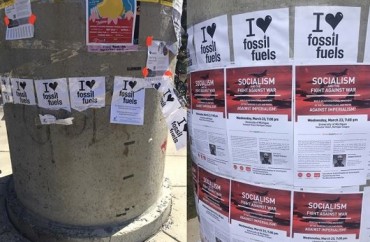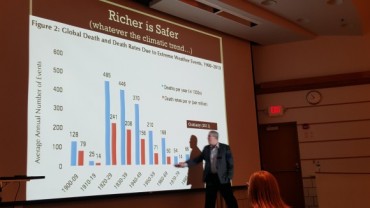
There’s more trees and animals on the planet today than ever before thanks to fossil fuels, a professor told a room full of University of Michigan students Wednesday.
Many assign blame for deforestation and animal extinction on fossil fuels, when in reality most of it occurred well before the widespread introduction of oil and coal use, said Dr. Pierre Desrochers, associate professor of geography at the University of Toronto and senior fellow at the Center for Industrial Progress.
The guest lecturer came as some students demand the public university divest from companies that profit from fossil fuels, calling such divestment a moral choice and way to fight climate change.
But Desrochers — invited to campus to argue the “Moral Case For Fossil Fuels” — said divestment would cause more problems and solve few, if any.
He told the 125 or so students in the audience that before the development of fossil fuel use, animals were slaughtered on a massive scale for food, clothing and many other uses, and forests were razed for wood. In fact, possibly as much as 90 percent of animal extinction and deforestation appeared before the introduction of fossil fuels, he said.
But the use of coal and oil reversed that trend, he added, noting coal helped replace firewood and charcoal in many instances. Moreover, tractors were invented, producing food faster and more efficiently. Forest cover, which had been decreasing until then to make way for farmland and for wood to supply fuel, started increasing from 12 percent to 24 percent, he said.
“We produced a lot more food on a lot less land after carbon fuels,” Desrochers said.
RELATED: Professor warns students: Planet on verge of global apocalypse due to human activity
The talk went largely without incident despite the fact that campus flyers touting the guest lecture were vandalized repeatedly leading up to the event.
 But the only outburst during the talk came from a student who shouted out that Desrochers was attempting to commodify black lives. The comment was made as Desrochers discussed a problem in Africa in which its residents largely rely on a domestic food supply, leading to a chronic state of undernourishment and ultimately deaths in the poverty-stricken continent.
But the only outburst during the talk came from a student who shouted out that Desrochers was attempting to commodify black lives. The comment was made as Desrochers discussed a problem in Africa in which its residents largely rely on a domestic food supply, leading to a chronic state of undernourishment and ultimately deaths in the poverty-stricken continent.
Ultimately, the expert said, fossil fuel divestment proponents are willing to sacrifice companies’ dividends that support their universities and the financial aid they supply to low-income students. Yet, he said, these same protesters are rarely willing to live the change they wish to see in the world.
It’s consumers who actually burn the most fuels. The process of extraction, processing and transportation represents only 20 to 30 percent percent of emissions, whereas consumers shoulder 70 to 80 percent of emissions, he said.
“We abolished slavery; apartheid was abolished,” he said. “So if fossil fuels are so bad, why don’t we boycott them? We realize that boycotting fossil fuels might involve some real sacrifices. Now I have not heard of any fossil fuel activist make any real sacrifices, so how can they tell us to?”
Yet the divestment movement has seen a success at several colleges, such as Georgetown, Stanford and University of Washington. To what end?
The divestment movement only targets publicly traded companies, which produce a tiny amount of carbon fuels. The larger global players are privately traded companies, and thus the divestment movement has no effect on these as they are not traded on the stock market, he said.
 Fossil fuels aren’t the hideous monsters they are presented to be, he argued. In fact, the increasing use of fossil fuels since the 1850s is in tandem with an increase in life expectancy of people in both developed and developing nations, increasing from 28 years in 1820 to 71 years in 2000, on average. This is also paralleled with an increase in body size and standard of living over the years, he added.
Fossil fuels aren’t the hideous monsters they are presented to be, he argued. In fact, the increasing use of fossil fuels since the 1850s is in tandem with an increase in life expectancy of people in both developed and developing nations, increasing from 28 years in 1820 to 71 years in 2000, on average. This is also paralleled with an increase in body size and standard of living over the years, he added.
Fossil fuels also help deliver foods faster and farther than ever before, fighting poverty and hunger and helping economies thrive, he said.
Carbon fuels led to railroads, which can carry enormous loads of food over long distances. Now each region, instead of trying to feed itself, specializes in creating what its best at, making food affordable and increasing prosperity and development, he said.
In the past, “backyard chickens were not a lifestyle statement; it was a necessity,” Desrochers said.
He also dismissed the notion that fossil fuels lead to global warming.
“Climate changes all the time,” he said.
Meanwhile, even University of Michigan President Mark Schlissel has dismissed students’ pleas to divest from fossil fuels, telling protesters in a statement that while he appreciates their “commitment and passion,” their request is not “linked to immoral and unethical actions and ideologies.”
“Fossil fuels enable us to operate the university, to conduct research and to provide patient care,” he said. “At this moment, there is no viable alternative to fossil fuels at the necessary scale. In addition, most of the same companies that extract or use fossil fuels are also investing heavily in a transition to natural gas or renewables, in response to market forces and regulatory activity.”
RELATED: More ‘cli-fi’ in the college classroom: Great (and not-so-great) climate doomsday stories
Like The College Fix on Facebook / Follow us on Twitter
MAIN IMAGE: Shutterstock





Please join the conversation about our stories on Facebook, Twitter, Instagram, Reddit, MeWe, Rumble, Gab, Minds and Gettr.